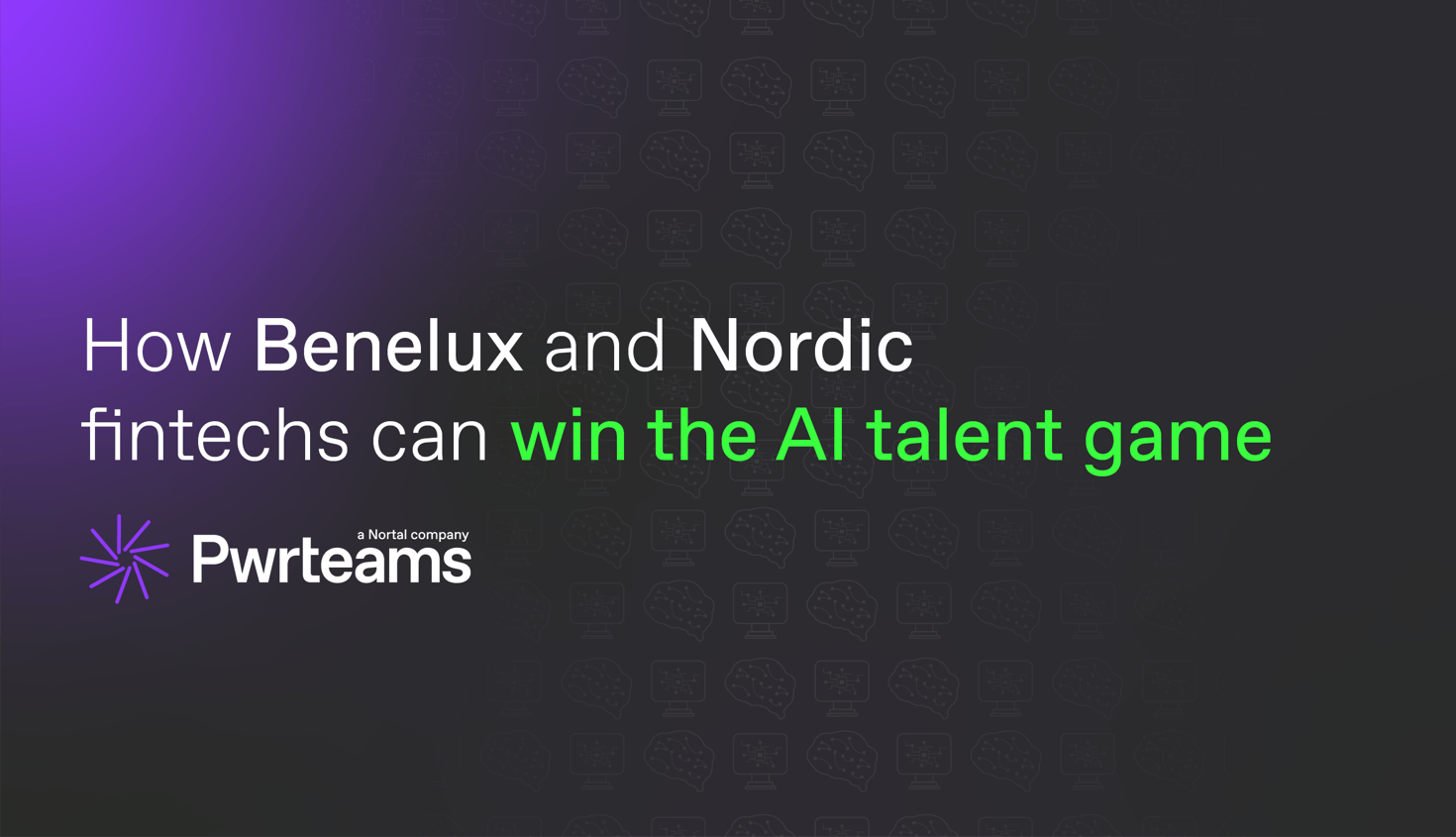How Benelux and Nordic fintechs can win the AI talent game


By 2030, an estimated 83% of European financial services firms will have adopted AI technologies, with the Benelux and Nordic regions leading the charge. Amsterdam dominates European fintech while Stockholm aggressively pursues that crown, both capitals backed by robust economies, long-standing banking traditions, and heavy AI investments that power fraud detection, personalised services, and operational efficiency.
But there's a problem that threatens this entire ecosystem: talent.
These regions face the same AI-driven workforce transformation hitting everywhere else, demanding massive reskilling initiatives. Yet fintechs from Sweden to Luxembourg can't pause innovation while waiting for AI-proficient talent to materialise. The market doesn't wait, and neither do competitors.
These regions face an acute skills mismatch: while AI adoption accelerates, the talent pipeline lags. The numbers are sobering. Some 56% of European financial professionals report feeling unprepared for AI integration. The Dutch AI Monitor reveals a widening chasm between AI job openings and qualified candidates. Norway confronts the starkest reality: without systematic AI upskilling measures, the country "risks a five-year delay in adopting generative AI," potentially slashing annual GDP potential from 9% to just 2%!
Long-term initiatives like the European Commission's 2025 AI Continent Action Plan offer promise, but forward-thinking fintechs from Sweden to Luxembourg face an immediate dilemma. Building deep AI expertise requires years of development, yet competitive pressures demand skilled professionals today. Innovation cycles won't pause for talent development, and neither will competitors.
We know how to solve this challenge. But first, let's examine what's happening in the region's AI landscape.
AI in fintech: Leading applications across Benelux and Nordics
AI's transformative power reaches its peak in knowledge-intensive service sectors, and finance sits at the epicenter. The combination of massive data volumes, complex decision-making processes, and regulatory demands creates the perfect environment for AI to deliver measurable business impact.
The Benelux and Nordic regions recognised this opportunity early and built their fintech ecosystems accordingly. Their regulatory frameworks embraced innovation, their banking infrastructure supported experimentation, and their tech talent gravitated toward financial services. This convergence produced a generation of AI-first companies that happen to operate in finance. Their competitive advantage stems from treating artificial intelligence as core infrastructure, not a feature add-on.
The results speak for themselves: Swedish decacorn Klarna ($15 billion valuation) revolutionised buy-now-pay-later with AI-powered credit decisions. Danish unicorn Pleo transformed business expense management through intelligent spending insights. Dutch payment giant Mollie became one of Europe's fastest-growing providers by embedding AI into every transaction layer.
Across the region, this AI-first approach manifests in several key applications that define modern fintech:
-
Payments intelligence
This category encompasses real-time risk scoring at checkout, payment orchestration, and AI-driven ecosystem protection for merchants and end users. For example, Swedish Trustly has launched AI-enabled recurring payments solutions that streamline merchant integrations and enhance transaction efficiency, using predictive models to initiate payments at the optimal time and reduce transaction failures. Nordic platform Paytrim leverages automation and machine learning to provide real-time operational insights, detecting anomalies and optimising workflows to improve cash flow and payment performance.
-
Fraud detection & AML automation
Fraud detection and AML automation represent mature AI applications across the region, where real-time anomaly detection and machine learning models minimise false positives while uncovering complex risks. Belgian Eastnets delivers adaptive AI fraud prevention with real-time threat adaptation, while Icelandic Lucinity combines machine learning with human oversight to enhance financial crime detection. Regional leaders like Nordea and ING deploy sophisticated graph neural networks and behavioral analytics, achieving fraud detection rates above 99.5%.
-
Customer service & personalisation (LLM agents)
LLM-powered customer service and personalisation have become well-established across Benelux and Nordic fintech organisations. Klarna's AI Assistant handles two-thirds of customer service interactions, managing refunds, returns, and payment disputes around the clock, though the company recently adopted a hybrid approach blending human agents with AI to maintain quality standards. Dutch digital bank Bunq employs LLM-based agents for proactive personalisation while reducing response times. Notably, one of their support chatbots emerged from an internal hackathon where the bank crowdsourced innovative customer service solutions.
-
Compliance/RegTech & investigations
Know Your Customer (KYC) and anti-money laundering processes across the region benefit from computer vision and document analysis AI. Nordic KYC and RegTech specialists combine biometric verification, document authenticity checks, and real-time database matching to complete customer onboarding in under 60 seconds with 99.8% accuracy rates, all while significantly reducing compliance costs.
-
Market & trading/ops analytics (capital markets)
Nordic asset managers and trading firms like Nordnet and Avanza employ reinforcement learning algorithms for portfolio optimisation, risk assessment, and algorithmic trading strategies. AI-powered systems process millions of market signals, news sentiment, and macroeconomic indicators to generate alpha while managing downside risk, with quantitative funds in the region reporting 15-25% improvement in risk-adjusted returns compared to traditional approaches.
What makes a strong AI team in fintech?
We’ve provided some context, and we promised solutions to tackle the ever-present and disturbing AI skills gap. For example, in the Netherlands, 55% of companies report shortages that slow the delivery of AI use cases. But statistics and aggregated research can be misleading. They often lump all “AI experts” into one category, as if a single person could define use cases, develop models, handle DevOps, and manage projects end-to-end –much like expecting a single “Marketer” to design a global go-to-market strategy while posting TikTok reels.
Let’s unpack what’s meant by the broad label of “AI expert” and examine how the Benelux and Nordic regions rank in terms of the availability of these different types of specialists:
Data scientists & ML engineers
MLOps engineers
Cloud architects
Compliance & ethics officers
AI product managers
Change management leads
The top reasons your fintech AI teams fall short
Even well-funded AI projects can flop if the team setup isn’t right. In fintech, the stakes are even higher: tighter rules, legacy tech, and slimmer margins. And yet, the same traps keep showing up, burning your money, and wasting time.
Often, the issues aren’t purely technical. They include organisational blind spots like mismatched team structures, hard-to-fill specialist roles, or fragmented execution.
-
Lacking a clear business goal
Here’s a common trap: building AI just to say you’re using AI. Without measurable objectives like improving fraud detection accuracy or cutting onboarding time, projects get abandoned. Gartner found that 30% of AI initiatives fail due to "unclear business value.” Before writing a line of code, define what success looks like. Maybe it’s fewer fraud cases, faster customer onboarding, or better credit scoring. Whatever the case, you need it spelt out in block capitals.
And yet, even this step is often overlooked. When we looked at why so many AI projects go wrong, one issue kept coming up: missing leadership. Tech teams don't need someone who can “run a project.” An effective AI Lead in fintech must bring more than technical knowledge; they need business insight, regulatory awareness, and hands-on delivery experience. They must understand compliance constraints (like GDPR, PSD2, and AML/KYC regulations) and the commercial objectives driving the adoption. Such a vast skillset is often hard to find.
At Pwrteams, we connect you with vetted PMs who’ve worked across multiple fintech deployments, including cross-border rollouts. We typically match the right person to your project in just a few weeks, so you don’t have to delay delivery while trying to hire.
The odds are against you: up to 80% of AI projects might fail, and 30% don’t even make it past the proof-of-concept stage. That's why we've put together the essential tools, frameworks, and roles you need.
-
Ignoring data privacy concerns
In Benelux and the Nordics, launching an AI model without regulatory safeguards isn’t just risky – it can be non-compliant. Under GDPR, firms must guarantee data protection and explainability, while PSD2 requires secure authentication and transparent payment processing. National regulators like the AFM (Netherlands), FSMA (Belgium), Finanstilsynet (Denmark & Norway), and Finansinspektionen (Sweden) enforce strict expectations around fairness, accountability, and consumer rights. AML and KYC directives, harmonised under EU law but supervised locally, add another compliance layer, making “black-box” decisioning a non-starter.
Unfortunately, too many teams treat compliance like a final check before launch. That’s a mistake, especially in AI-driven fintech. Regulatory requirements shouldn’t be an afterthought. The rules need to shape what you’re building right from the start. That’s why fintech compliance managers need more than regulatory know-how. They’ve got to keep up with shifting laws and understand AI. Otherwise, your product and licence may take a serious hit if they fall behind.
To avoid that, we bring in sharp, experienced compliance managers and AI governance experts who’ve worked in financial services and know the tech and the regulatory aspects inside out. And because of our vast talent network and a framework for fast engagement and onboarding, they’re here to support your projects from day one, not week twelve.
-
Chaotic infrastructure
Fintech data is all over the place, spread across payment systems, credit platforms, CRMs, and spreadsheets. Almost half of enterprises cite poor data readiness as the top reason AI projects get delayed or fail. RAND calls underinvestment in infrastructure one of the most common AI failure points.
This isn’t something you can fix with one hire or a bunch of freelancers. You need a cohesive team of data engineers, cloud architects, MLOps, and other roles, with shared context, not scattered contractors or a team that takes months to assemble. But many of these roles are notoriously hard to fill in the Benelux and Nordics regions.
The Netherlands has a particular reputation for being one of Europe’s toughest markets to find qualified IT teams, with science and engineering talent in especially short supply. In the Nordics, AI skills shortages rank as the second-biggest barrier to scaling AI for 40% of companies. That’s when Benelux and Nordic fintechs turn to us.
Rather than piecing together hires, we deliver a fully formed, tightly aligned team drawn from a talent network we’ve been growing for nearly 20 years. Without onboarding delays and without team-building from scratch.
-
Breaking at scale
A proof-of-concept that works for 1,000 records might crash at 100,000. Yet, many AI teams don’t plan beyond the pilot phase, often due to a lack of direction. That’s when infrastructure, monitoring, or even model accuracy breaks down.
Traditional hiring compounds the problem—it's slow, rigid, and poorly suited for dynamic AI projects. In-house recruiting takes months, while scaling up or down remains costly and inflexible.
We’ve seen what works better.
For one fintech client, Funding Circle, we built a team of nearly 50 engineers to power a machine learning platform from the ground up. The project moved fast, but so did the demands. Because the team was fully managed and nearshore, they could scale as needed, without operational bottlenecks or long-term commitments. When the workload spiked, we added capacity.
-
Piecemeal AI teams
Even with good infrastructure, AI fails when the team behind it isn’t aligned. When leads, compliance, product, and engineering operate in siloes, the AI-driven outcome likely won’t meet the core business and customer needs. Only well-coordinated teams can jump the hurdles of overlooked regulatory requirements or features without user input.
In our project for C-Quilibrium, we quickly delivered a blended team that included core developers, a database engineer, DevOps support, QA, and a dedicated innovation unit working on new product features. They weren’t scattered freelancers; they came as a unit, with shared tools, context, and goals. The result? Faster delivery, fewer bottlenecks, and a system built around the real operational, with the added benefit of staying 25% under budget.

Solving the AI talent shortage in Benelux and Nordics
Knowing which roles and skills you need to reinforce your AI lineup is half the success. Ramping your team up quickly and in a scalable way - that’s the hard yards.
Whatever team mix worked in the early run will likely be insufficient to deal with the challenge of AI implementation. A solo Data Scientist or a PM who’s stretched thin by now might have taken your project off the ground, but they won’t suffice to push the project across the line, especially if it involves AI tech.
As your fintech scales and risk ramps up, your AI team needs a rethink. Here’s a quick breakdown of how fintech leaders may expand their AI teams, stage by stage:
|
Role |
Seed |
Series A |
Growth |
Mature |
|
AI product manager |
0.5 FTE senior (shared with founder) |
1 full-time |
1 lead + 1 associate |
1 per AI product line |
|
Data scientist/ML engineer |
1 generalist |
2-3 core model owners |
4-6 incl. domain specialists (NLP, graph, time-series) |
Embedded in each domain squad |
|
MLOps engineer |
Ad hoc by ML engineer* |
1 |
2-3 |
4-5 plus 24/7 support rotation |
|
Data engineer |
Contractor to build the first pipelines |
1 |
2 |
3-4 |
|
Cloud architect |
External advisor (1-2 days/month) |
0.5 FTE (shared) |
1 dedicated |
Architecture guild/centre of excellence |
|
Compliance & ethics lead |
Part-time consultant |
1 internal or on retainer |
1 senior + analyst |
Full risk & compliance function |
|
QA/validation |
n/a (founder-led) |
1 |
2 incl. test automation |
Dedicated test-engineering team |
|
Change management lead |
n/a (founder-led) |
Consultant on a project basis |
1 full-time |
Integrated into PMO |
*Add a dedicated MLOps engineer as soon as models are customer-facing or fall under regulatory oversight.
In fintech and AI, delay means defeat, so time plays a critical role. Your teams must evolve fast, but smart, always leaving space to course-correct. Tightly aligned, cross-functional teams that you can grow or slim down on demand give you the edge. They help you close AI skills gaps quickly, reliably, and with minimal risk.
Sourcing hard-to-find AI talent with Pwrteams
With 45% of Nordic enterprises and 63% of Dutch ones struggling with filling vacancies, hiring locally is a long game. Niche roles like MLOps engineers, cloud architects, or AI compliance officers are especially challenging to fill, as they are among the hardest to find and the most urgent to fill.
We help you move faster, building dedicated, nearshore teams that integrate seamlessly with your roadmap and start delivering in just 4-8 weeks, not months. Each team is tailored to your stack, culture, and compliance needs, with AI, cloud, blockchain, and financial regulation experts.
With Pwrteams, you get:
- Speed: Full teams, ready fast, while local hiring drags on.
- Savings: Up to 50% lower costs than local hires, thanks to our Eastern European talent network.
- Stability: 95.7% retention rate, compared to 20-30% churn in tech recruiting.
- Fintech-ready skills: We’ve filled over 120 roles across finance and fintech, delivering talent fluent in regulatory frameworks and secure AI deployment.
Whether you need to expand quickly, backfill a gap, or reinforce your internal team, we’ll help you get the right people in place, right when you need them.
Finding AI experts doesn’t have to be the hard part
The same regions that recognised AI's potential early, from Amsterdam's fintech innovation hub and Stockholm's emerging tech powerhouse, now face their biggest challenge: finding the talent to maintain their competitive edge.
We help solve that. At Pwrteams, we build high-performing, nearshore AI teams in weeks, not months. Our specialists are vetted, embedded, and built for fintech, from data science to compliance.
You focus on your roadmap. We’ll bring the team to build it.
Ready to accelerate your AI initiatives? Let's discuss how we can support your growth.
 September 29, 2025
September 29, 2025
Build your team or extend with ours? Here’s what helps fintech CTOs decide
Read the post September 10, 2025
September 10, 2025
Fixed-price projects vs dedicated teams: A fintech CTO comparison
Read the post September 3, 2025
September 3, 2025
How burnout is crippling tech leadership in the Nordics and Benelux
Read the post September 29, 2025
September 29, 2025
Build your team or extend with ours? Here’s what helps fintech CTOs decide
Read the post September 10, 2025
September 10, 2025
Fixed-price projects vs dedicated teams: A fintech CTO comparison
Read the post September 3, 2025
September 3, 2025
How burnout is crippling tech leadership in the Nordics and Benelux
Read the postWrite your own
success story
with Pwrteams!
Share your details in the form, tell us about your needs, and we'll get back with the next steps.
- Build a stable team with a 95.7% retention rate.
- Boost project agility and scalability with quality intact.
- Forget lock-ins, exit fees, or volume commitments.